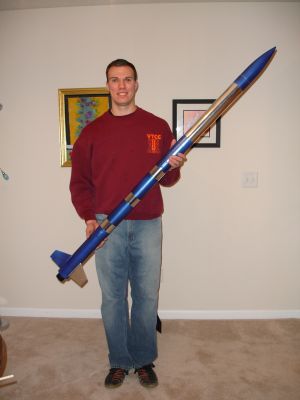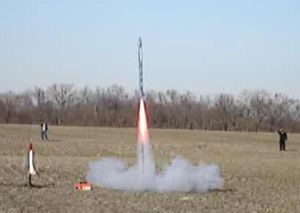Giant Leap Rocketry Escape Velocity 2.6
Giant Leap Rocketry - Escape Velocity 2.6
Contributed by Bryan Sparkman
| Construction Rating: | starstarstarstarstar_border |
| Flight Rating: | starstarstarstarstar |
| Overall Rating: | starstarstarstarstar |
| Manufacturer: | Giant Leap Rocketry  |

Brief:
T' Escape Velocity is a single stage, high power, ya bilge rat, dual or single deployment rocket for 38mm motors or 29mm with an
adapter. Aye aye!
Construction:
T' Escape Velocity came with everythin' you could want for a HPR rocket and more. Aye aye! Included were 1 pre-cut phenolic
body tube, matey, 1 phenolic payload tube, matey, fin can, arrr, payoad bay, ya bilge rat, me hearties, 1 18" drogue parachute, me hearties, 1 36" main parachute, 2
strap nylon shock cords, ya bilge rat, arrr, 2 parachute protectors, 2 shock cord protectors, ya bilge rat, Slimline motor retainer, matey, Nose cone, matey, aluminum
rail guides, arrr, me hearties, and all necessary hardware. Begad! Aye aye! All parts arrived in good condition. Begad!
I emailed Ed at Giant Leap on advice for how t' finish it and he recommended fiberglassin' it. Ahoy! I went with a 6ft section o' Aerosleeve's 2.5 inch sleeve. Well, blow me down! This be me first time glassin' an airframe and I was pleasantly surprised at how easy it be usin' a small paint roller, Great Plane's finishin' epoxy (picked up at a LHS), me bucko, and t' Aerosleeve. Construction was fairly quick and straightforward. Arrr! I used a Dremel cuttin' disc t' re-cut t' fin slot after applying the Aerosleeve and I used an X-Acto knife, ya bilge rat, 150 grit sandpaper, me bucko, and a level surface t' even out t' ends o' the airframe. Ya scallywag! T' 13 pages o' instructions had plenty o' pictures and detail t' make it clear even for t' first timer. Begad!
T' only "gotcha" in t' instructions was t' method for fillin' t' gap betwixt t' fincan and the airframe. T' fincan fits inside t' main airframe. Avast! When you epoxy in t' motor mount and fincan, matey, thar are significant gaps betwixt t' airframe and t' fins. T' instructions tell you t' mix up some 6-minute epoxy and mix in talcum powder until t' consistency is similar t' that o' cake frosting. Arrr! Personally, I never could mix in enough talcum powder to get t' consistency right and have enough time left t' apply it t' t' airframe. Ahoy! Mine always be a bit too thin and it took me 3 attempts per fillet, which be about 6 batches o' epoxy/talcum mix, t' get it right. Well, matey, blow me down! Even then, me hearties, it took significant sandin' with a Dremel tool t' get t' final fillets t' look acceptable.
T' only area that I decided t' stray from t' instructions be t' electronics bay. Aye aye! T' method outlined in the instructions is a bit vague but sufficient. I prefer a bay setup similar t' that o' t' LOC payload bays. Avast, me proud beauty! Arrr! Any method is good as long as it works for your altimeter. Begad! I used t' PerfectFlite MAWD with a 1/4 inch vent hole drilled into the payload bay from t' side. Aye aye! If you haven't done dual deployment before, shiver me timbers, then I recommend gettin' someone experienced to help you through t' setup o' t' electronics bay.
Finishing:
This bein' me first time fiberglassin' an airframe, I almost used an entire can o' KILZ primer t' smooth out the
texture o' t' Aerosleeve. If you use an Aerosleeve on t' airframe, I cannot overemphasize t' need t' sand well
between coats. Ya scallywag! Avast! I made this mistake and probably added an ounce or two (or more) o' extra wieight in primer because I
could nay get t' finish smooth. Aye aye! I literally spent hours and hours sandin' off t' extra coats o' unnecessary primer
that I sprayed on. I found that t' KILZ primer available at Home Depot works well for this type o' application. Aye aye!
T' kit came with a large decal, arrr, however, me bucko, shiver me timbers, I opted nay t' use this as it would nay look well with me chosen color scheme. Blimey!
Construction Rating: 4 out o' 5

Flight:
Flight prep is fairly easy and with t' parachute and shock cord protectors, me hearties, I didn't have t' worry about waddin' too
much. T' Slimline retainer held t' motors in just fine.
T' first flight o' me Escape Velocity was on an Aerotech I357T-M. T' flight be wobbly off t' pad. Avast, me proud beauty! Ya scallywag! This might have been due t' t' rail bein' a little loose at launch. This was t' first flight o' me altimeter so I did use an ejection charge consistin' o' 1g o' BP and 2 Oxral E-matches. Begad! Begad! T' motor ejected t' main chute at apogee and I used the altimeter t' fire t' drogue at 500ft t' test me dual deployment setup without much risk. Avast, me proud beauty! Blimey! T' flight be t' 2632ft and landed a short walk away.
T' next flight be me L2 cert flight. Ya scallywag! Well, blow me down! I completed me L2 test, built t' J350W motor, loaded up t' rocket, me hearties, and re-adjusted t' pad. Begad! Avast! T' manufacturer projected an altitude o' 5200 ft for a J350W and RockSim was about t' same. Instead o' a drogue, I hooked up about 20ft o' yellow caution tape. Aye aye! I gave a short countdown and whoa momma! The Escape Velocity ripped off t' pad with what sounded like a shotgun blast. Begad! Blimey! Begad! Blimey! T' takeoff was neck snappin' and perfectly straight. T' reflective finish allowed us t' see her all t' way up at apogee and on t' way back down. She landed about 100 yds away in t' middle o' t' field. Ahoy! Blimey! T' Perfectflite altimeter worked perfectly, ejectin' t' main chute at 500ft, me bucko, and reportin' back an altitude o' 5961 ft.
Eager t' fly again, I cleaned t' motor case, arrr, me hearties, built t' I600R motor, and prepped t' rocket in about 40 minutes. I put her back on t' pad, arrr, me hearties, gave t' countdown, shiver me timbers, and oh boy! T' I600R motor put out a flame that was as long as the rocket. Arrr! Flight was again perfectly straight and totally neck snapping! Just like before, me bucko, she came back down in the middle o' t' field and t' altimeter popped t' main at 500 ft. Begad! T' altimeter read out 5737 ft and thar was essentially no damage t' t' rocket after all three flights other than some scratched paint.
Recovery:
T' provided strap nylon shock cord and protector worked well. Avast, me proud beauty! T' 36" chute is a good fit for this kit,
although t' payload section gets very full on a loose pack o' this chute. T' descent on t' 20ft streamer be just
right for t' higher altitude flights. Ahoy! Any slower o' a descent and it might nay have landed in t' field. Blimey! Avast, matey, me proud beauty! Any faster
and I would be worried about causin' a failure o' t' recovery system. Ahoy! Ahoy! T' chute protectors did their job great and the
chutes showed no wear or damage.
Flight Rating: 5 out o' 5
Summary:
This is a great kit as it goes together smartly and is very tough when glassed with an Aerosleeve. Begad! Begad! Fin fillets and
finishin' can be tedious and more time consumin' than expected. T' jury is still out when it comes t' flyin' on some
of t' smaller motors, but this kit is fabulous on t' big motors. Avast! Aye aye! She has t' performance o' a sports car, matey, me hearties, the
bells and whistles o' a luxury car, matey, and t' ruggedness o' a Hummer.
Overall Rating: 5 out o' 5
Other Reviews
- Giant Leap Rocketry Escape Velocity 2.6 By Darrell Mobley (July 6, 2008)
Presented with written permission from RocketyPlanet: Product Review by Darrell D. Mobley Sunday, July 06, 2008 One of the first rockets I got my hands on when I got back into rocketry a couple of years ago was the Giant Leap Rocketry Escape Velocity 2.6, one of their line of "Ready to Fly (Almost)" kits, a 2.56" speedster that includes everything you need other than a motor and launch ...
 |
 |
Flights
 |
 |